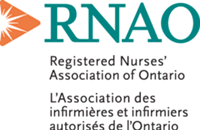Media Release: New guideline on safe sleep says back is best for baby
TORONTO, Feb. 25, 2014 /CNW/ - A set of recommendations aimed at creating a safe sleep environment for infants will be unveiled in Toronto this week.
The recommendations, contained in a clinical practice guideline titled Working with families to promote safe sleep for infants 0-12 months of age, were developed by the Registered Nurses' Association of Ontario (RNAO).
"A lot of myths and misunderstanding about the best way to position a baby still exist, and we hope this guideline will lay the debate to rest," says Elyse Maindonald, a nurse practitioner with the Windsor Family Health Team, who led the panel of experts that created the guideline.
Maindonald says the panel reviewed the evidence and came to the conclusion that the safest place for an infant to sleep is on their back, and alone, in a crib that meets Canadian safety standards. Maindonald says cradles and bassinets with sides that allow air flow are also considered safe places for a small infant to sleep.
RNAO's guideline backs up previous research that strongly encourages parents to avoid using blankets, pillows and other forms of sleep aids for their baby, including positioning devices, head coverings and soft toys, which can all block an infant's airway.
The panel conducted a comprehensive review of all the factors that can affect and shape a child's safe sleep environment. "Given what we know about Sudden Infant Death Syndrome (SIDS), we feel confident that putting a baby to sleep on his/her back along with other important considerations, such as not smoking and the importance of breastfeeding, greatly reduces risk," says Maindonald.
The 'back is best' recommendation applies throughout the first 12 months of a child's life. The guideline also lists sleep surfaces that are not recommended for infants. They include: an adult's bed, sofas, couches, armchairs, playpens, swings, strollers, slings and car seats.
While would-be and new parents may be tempted to choose from a myriad of baby products, the guideline recommends a firm mattress and fitted sheet are all that is needed to create the safest sleep surface for a baby. Maindonald says many people believe that it is necessary to keep a sleeping baby warm with blankets and head coverings, but the evidence runs counter to that idea. "Infants over two months of age who are overheated are actually at an increased risk of SIDS," she says.
Yolanda Guitar, a mother whose four-month-old son died of SIDS in 2004, says she hopes the guideline lends credibility to an issue that's important but one few people want to talk about. Guitar sat on RNAO's panel and is certified as a safe sleep expert. "We need to make sure that this subject is discussed more openly, whether it's during prenatal classes or after a woman has given birth in hospital. This shouldn't be a taboo topic."
Dr. Monique Lloyd, who leads guideline development for RNAO, says she hopes the guideline will be embraced by nurses and health-care organizations alike. "We want every nurse armed with the latest evidence about how to create as safe a sleep environment as possible so they can share this information with new parents," she says. Lloyd will be presenting the panel's recommendations at the Best Start Resource Centre's annual conference in Toronto on Thursday, Feb. 27, 2014 from 3:00 to 4:30 p.m. The conference is a key program of Health Nexus, which is funded by the Government of Ontario.
RNAO's Best Practice Guidelines Program is funded by the Ministry of Health and Long-Term Care, and was launched in 1999 to provide the best available evidence for patient care across a wide range of health-care settings. The 50 guidelines developed to date are a substantive contribution towards building excellence in Ontario's health-care system. They are available in several languages to nurses and other health-care professionals across Canada and abroad.
The Registered Nurses' Association of Ontario (RNAO) is the professional association representing registered nurses in Ontario. Since 1925, RNAO has advocated for healthy public policy, promoted excellence in nursing practice, increased nurses' contribution to shaping the health-care system, and influenced decisions that affect nurses and the public they serve.
For more information about RNAO, visit our website at www.RNAO.ca. You can also check out our Facebook page at RNAO.ca/facebook and follow us on Twitter RNAO.ca/twitter
SOURCE: Registered Nurses' Association of Ontario

To arrange an interview with a nurse about this guideline, or for more information, please contact:
Marion Zych, Director of Communications, RNAO
Cell: 647-406-5605 / Phone: 416-408-5605
Toll free: 1-800-268-7199 ext. 209
[email protected]

Share this article